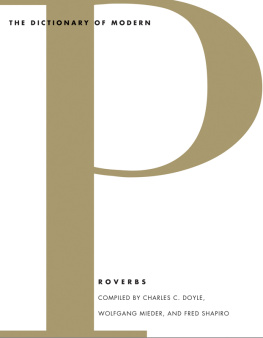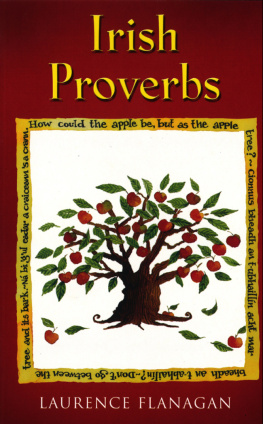www. upress.state.ms.us
The University Press of Mississippi is a member of the Association of
American University Presses.
Copyright 2014 by University Press of Mississippi
All rights reserved
Manufactured in the United States of America
First printing 2014
Library of Congress Cataloging-in-Publication Data
Mieder, Wolfgang.
Behold the proverbs of a people : proverbial wisdom in culture, literature, and politics / Wolfgang Mieder.
pages cm
Includes bibliographical references and index.
ISBN 978-1-62846-140-4 (hardback) ISBN 978-1-62846-141-1 (ebook)
1. ProverbsHistory and criticism. I. Title.
PN6401.M476 2014
398.9'09dc23
2014010121
British Library Cataloging-in-Publication Data available
published with a grant from
Jewish Federation of Greater Hartford
that truth be peopled
Introduction
It has been my good fortune to have had the welcome opportunity to present some of my articles that have appeared over the years in various journals and books in Europe and the United States in a number of essay volumes, to wit The Politics of Proverbs: From Traditional Wisdom to Proverbial Stereotypes (1997), Strategies of Wisdom: Anglo-American and German Proverb Studies (2000), Proverbs Are the Best Policy: Folk Wisdom and American Politics (2005), and Proverbs Speak Louder Than Words: Folk Wisdom in Art, Culture, Folklore, History, Literature, and Mass Media (2008). About five years have passed since the appearance of the last book, and I am delighted to put forth this fifth volume entitled Behold the Proverbs of a People: Proverbial Wisdom in Culture, Literature, and Politics, whose thirteen chapters bear witness to my ongoing dedication to tilling the fascinating field of international paremiology. Its main title comes from Carl Sandburgs lengthy poem Good Morning, America (1928), in which he characterizes the United States as a country of immigrants and numerous ethnic groups by way of its multifaceted language. As an immigrant from Germany myself, I still remember when I came across this poem in 1970. I was so taken by its spirit of multicultural and linguistic diversity that it resulted in my first publication written in English: Behold the Proverbs of a People: A Florilegium of Proverbs in Carl Sandburgs Poem Good Morning, America, Southern Folklore Quarterly 35 (1971): 16068. Two years later I followed this up with a more detailed analysis in the same journal of Sandburgs powerful epic poem The People, Yes (1936), still the perfect work to introduce people to the cultural and linguistic mix that characterizes this country. But be that as it may, there are two lines in the eleventh section of Good Morning, America that have stuck with me for over forty years, and they have surely become proverbial to me, as I enjoy citing them in my studies and at the beginning of my large lecture course on Big Fish Eat Little Fish: The Nature and Politics of Proverbs that I teach every year at the University of Vermont:
A code arrives; language; lingo; slang;
behold the proverbs of a people, a nation:
This call is followed by dozens of slang terms, idioms, and proverbial expressions in addition to such proverbs as Its the roving bee that gathers the honey, Business is business, Courtesy pays, The customer is always right, Figures dont lie but liars can figure, The good die young, The grass is higher in the back yard, Let one hand wash the other, The higher they go the farther they drop, Honesty is the best policy, What you dont know wont hurt you, There are lies, damned lies, and statistics, Life is what you make it, Money isnt everything, Its hell to be poor, Speak softly and carry a big stick, War is hell, and Its all in the way you look at it. Many of these proverbs registered by Carl Sandburg reappear in the thirteen chapters presented here that illustrate the ubiquity of proverbs in the United States and Europe. They will certainly show that it behooves us to behold the proverbs of a people and that proverbs give us a lens into the worldview of the people who make use of them to underscore lifes trials, tribulations, challenges, successes, fortunes, and joys.
It was not particularly difficult to divide my thirteen studies from 2007 until 2013 into four cohesive groups. The first is comprised of three chapters that deal with the field of paremiology in general, the spread of Anglo-American proverbs in Europe, and the phenomenon of modern proverbs. The second group consists of four chapters looking at the use of proverbs in the world of politics. Two of them analyze the effective employment of proverbs by Martin Luther King and President Barack Obama respectively. Next follows a chapter on proverbs as they relate to the concept of an interconnected world, and there is also an analysis of proverbs relating to war and peace. Another three chapters make up the group dedicated to literary topics: Ralph Waldo Emersons engaged interest in proverbs, the use and function of proverbs in modern mini-poems, and Friedrich Nietzsches philosophy expressed by way of his aphoristic reactions to proverbs. The last group is made up of three detailed cultural studies of the origin, history, dissemination, use, function, and meaning of the two proverbial expressions The dog in the manger and To build castles in Spain, as well as the American proverb Let George do it. Together the thirteen chapters comprise an intriguing and informative entry into the world of proverb scholarship, illustrating that proverbs always have been and continue to be in vogue today. I suppose I could say with proper humility that my book title Proverbs Are Never Out of Season: Popular Wisdom in the Modern Ages (1993) says it all when it comes to the omnipresence of proverbs with their multiple functions, contexts, and meanings. Proverbs are part and parcel of oral and written communication, and as so-called verbal and often metaphorically expressed monumenta humana they deserve to be studied from a multitude of viewpoints.
While the various chapters deal with a multitude of issues and approaches, they are connected by a rhetorical perspective that looks at proverbs as speech acts with text, texture, and context that have a noteworthy impact on oral and written communication within a culture and society. Whether proverbs appear in everyday speech, on the radio, on television, in films, on the pages of newspapers or magazines, in advertisements, in literary works of all types, or in political speeches, they are employed as formulaic verbal devices to add authoritative weight through tradition, convention, and wisdom. As communicative signs they also usually add metaphorical expressiveness to statements that otherwise might lack in rhetorical effectiveness. Proverbs certainly are not mere didactic bits of wisdom to be employed as generalized rules of life and behavior. Instead, they are communicative or rhetorical signs that put the entire human experience into formulaic and concise utterances to be repeated at the right moment as apparent truths. That does not mean that proverbs are universally true. In fact, they are as contradictory as life itself, but they are valid in certain situations. And, of course, proverbs can be manipulated to express a new insight or simply to make them fit into a novel context. Such anti-proverbs often have an additional rhetorical value in that they juxtapose the traditional wisdom with an innovative alternative. In any case, proverbs are invaluable social signs that have a great strategic influence on all types of communication.













